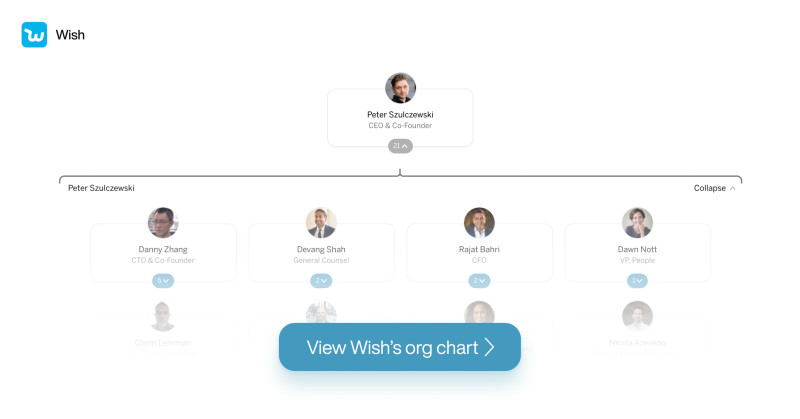Wish, the e-commerce site that sells you everything, has filed to go publicŌĆöthese are the key people who will take it there
Table of contents
San Fransisco-based e-commerce app Wish has submitted a confidential draft registration to the SEC for an initial price offering. The Org looks deeper into the company founded by CanadaŌĆÖs youngest billionaire.

Wish list
Originally, Wish was set up to for users to create ŌĆ£wish listsŌĆØ, akin to Pinterest, where it would let sellers know what customers were wishing for. But in 2013, after seeing potential for growth, the company decided to join the e-commerce game by selling direct to consumers and taking a 15 percent cut from its merchants, challenging e-commerce giants such as Amazon and Alibaba.
On launching, it had 500,000 daily users, . Wish quickly became focused on cheap, lightweight products it could ship from China across the world through the U.S.-China postal agreement ePacket.
Today, Wish boasts 70 million active users spanning 100 countries and 40 languages. In 2018 it was the most downloaded shopping app and in 2019 its sales made it the third-biggest e-commerce marketplace in the U.S. The majority of its merchants are based in China (the company doesnŌĆÖt release geographic distribution of sellers or customers), but last year it said it was increasingly looking to diversify marketsŌĆöparticularly into Latin America.
Despite competition, in 2019 the company saw revenue double on 2018 to $1.9 billion. It has raised $1.6 billion in funding since launching and was worth $11.2 billion at most recent valuation. The company is still not making a profit, in part due to heavy spending on advertising (it is one of Facebook's top advertisers and a sponsor of the LA Lakers). But, profit or not, it will take an IPO for the companyŌĆÖs financials to face real scrutiny.
Public facing
Leading the company public is founder and CEO Peter Szulczewski. Szulczewski, a Polish-born Canadian-raised businessman and computer engineer, cut his teeth in the tech world in a coding internship for Google at just 23 before having graduated from the University of Waterloo.
He became a fulltime Google employee, where he wrote the prototype algorithms for keyword expansion.
Szulczewski left Google to write code for an ad recommendations platform and in 2010 founded ContextLogic. He invited fellow Waterloo alumni Danny Zhang to join him, with the idea of building a next-gen mobile ad network to take on Google. That didnŌĆÖt quite go to plan and the pair pivoted to Wish.. ŌĆ£We never hypothesized going after value conscious consumers with unbranded goods, but the early data was indisputable,ŌĆØ Szulczewski wrote in a Medium post, adding there was an underserved market that his investors didnŌĆÖt believe in.
But 10-years on and as CanadaŌĆÖs youngest billionaire, Szulczewski can safely say the data was right.
Data-first development
Zhang, who cofounded Wish and is CTO, will continue to be a driving force in the companyŌĆÖs growth and transition, leading teams of engineers and developers.
Focused on data-centric, metrics-driven engineering and development, Zhang had years of experience before making Wish what it is today. He joined from AT&T Interactive, where he served as the Director of Engineering. Prior, he worked at Limewire as a founding engineer of LimeEngine, an entertainment-vertical ad-network, and spent four years as a tech lead at Yahoo.
Much of Szulczewski and ZhangŌĆÖs team is comprised of former Google, Facebook and Yahoo engineers that have first-hand experience in building industry leading consumer products. One of those is fellow Waterloo graduate, Tarek Fahmy, SVP of Engineering.
As the founder of Tafasa, which built award-winning BlackBerry apps, Fahmy has always been interested in product development.
When he joined Wish in 2012, Fahmy was the only mobile developer exploring an app strategy, and built out the initial Android and iOS apps. As the company transitioned to mobile e-commerce, he oversaw the shopper facing product and grew the team to more than 150 members.
Fahmy will be one of the key players responsible for keeping Wish fresh and user-focused as it hits new markets.
Building relationships
Helping with that growth will be Glenn Lehrmann, WishŌĆÖs first VP of Communications.
Lehrman, a business and communications leader with more than 20 yearsŌĆÖ experience, has been instrumental in helping build WishŌĆÖs brand awareness. ŌĆØBecause we have largely traditionally reached people through Facebook advertising, [customers] have been more product-focused than brand-focused,ŌĆØ Lehrman told Vox, adding he wanted to create customer relationships to increase return transactions.
Lehrman, who joined Wish from StubHub in 2018, said over time the company aimed to offer everything, becoming an online dollar store for a global customer base.
But the question remains, will the company be able to build on the last decade and continue to grow with challenges faced by the postal service and souring U.S. China relations? The IPO will help us gain valuable insight into that.
--
The Org is a professional community where companies can show off their team to the world. Join your company here to add yourself to the org chart!


The ┬▄└“┬ę┬ū helps
you hire great
candidates
Free to use ŌĆō try today
